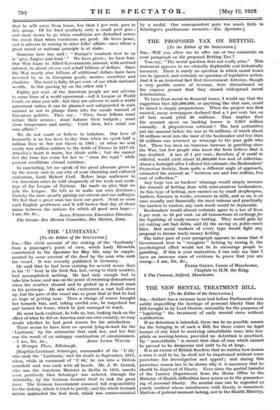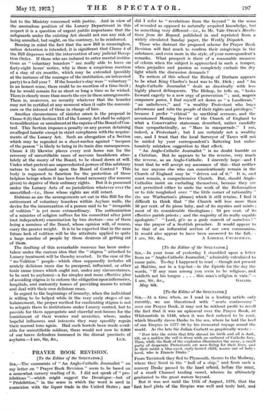THE NEW MENTAL TREATMENT BILL.
[To the Editor of the SPECTATOR.] SIR,—Seldom has a measure been laid before Parliament more subtly imperilling the heritage of personal liberty than the Bill brought in by Lord Onslow, ostensibly for the purposes of " legalizing " the treatment of early mental cases without certification.
If no detention is intended, there can be no possible reason for the bringing in of such a Bill, for there exists no legal barrier of any kind to receiving uncertifiable cases into hos- pitals or nursing-homes, provided no detention is practised. By " uncertifiable " is meant that class of case which cannot be proved to be dangerous and unfit to be at large.
It is an axiom of British freedom that no matter how insane a man is said to be, he shall not be imprisoned without some procedure for investigation and appeal ; and during this procedure reason has to be shown why it is necessary that he should be deprived of liberty. Ever since the partial transfer of the Lunacy Department from the Home Office to the Ministry of Health difficulties have arisen as to the guarantee- ing of personal liberty. No mental case can be regarded as purely medical where interference with liberty is concerned.. Matters of judicial moment belong, not to the Health Ministry,
but to the Ministry concerned with justice. And in view of the anomalous position of the Lunacy Department in this respect it is a question of urgent public importance that the safeguards under the existing Act should not run any risk of being annulled, but ought, on the contrary, to be reinforced.
Bearing in mind the fact that the new Bill is meaningless, unless detention is intended, it is significant that Clause 4 of the Bill dispenses with the intervention of any judicial Recep- tion Order. If those who are induced to enter mental institu- tions as " voluntary boarders " are really able to leave on forty-eight hours' notice, why is there a suspicious mention of a stay of six months, which may be extended (possibly at the instance of the manager of the institution, an interested party) to a full year ? If the boarder's stay were " voluntary " in an honest sense, there could be no mention of a time-limit ; for he would remain for as short or long a time as he wished. There is clearly more than meets the eye in these arrangements. There is, moreover, no security whatever that the boarder may not be certified at any moment when it suits the conveni- ence or the interest of those in charge of him.
Another circumstance of sinister omen is the proposal in Clause 6 (b) that Section 315 of the Lunacy Act shall be subject to modification or annulment at the caprice of the Board of Con- trol. This Section imposes a penalty on any person detaining an alleged lunatic except in strict compliance with the require- ments of the Lunacy Act. Such an abrogation of a Section which may be regarded as a sheet-anchor against " trespass of the person " is likely to bring in its train dire consequences. Clause 4 (b) likewise places every rest home run for the recovery of uncertifiable cases of nervous breakdown abso- lutely at the mercy of the Board, to be closed down at will. Under what pretext are unprecedented powers of this arbitrary nature to be conferred upon the Board of Control ? This body is supposed to function for the protection of those helpless beings whom it has been found necessary (for reasons given) to deprive of their ordinary rights. But it is possessed under the Lunacy Acts of no jurisdiction whatever over the uncertified—i.e., those whose rights are still intact.
Dubious as are the arrangements set out in this Bill for the enticement of voluntary boarders within Asylum walls, the device for the incarceration of a person said to be " incapable of volition " is yet more extraordinary. The authorization of a minister of religion suffices for his committal after joint (not independent) examination by two doctors—one of them being a nominee of the Board, whose opinion will, of course, carry the greater weight. It is to be expected that in the near future lack of volition will be the attribute applied to quite a large number of people by those desirous of getting rid of them.
The drafting of this remarkable measure has been under- taken under the curious idea that the " stigma " attached to Lunacy treatment will be thereby averted. In the case of the " no-Volition " people—which class supposedly includes all acutely delirious cases due to puerperal, influenza], or other toxic cause (cases which ought not, under any circumstances, to be sent to asylums)—a far simpler and more effective plan of avoiding stigma is to enforce the obligation upon infirmaries, hospitals, and maternity homes of providing means to retain and deal with their own delirious cases.
In regard to the beginnings of insanity, when the individual is willing to be helped while in the very early stages of un- balancement, the proper method for eradicating stigma is not to relegate them to institutions under Lunacy control, but to provide for them appropriate and cheerful rest-houses for the banishment of their worries and anxieties, where, under hopeful influences and interests they may speedily regain their normal tone again. Had such hostels been made avail- able for uncertifiable soldiers, there would not now be 6,000 of our brave defenders immured in the dismal precincts of



















































 Previous page
Previous page